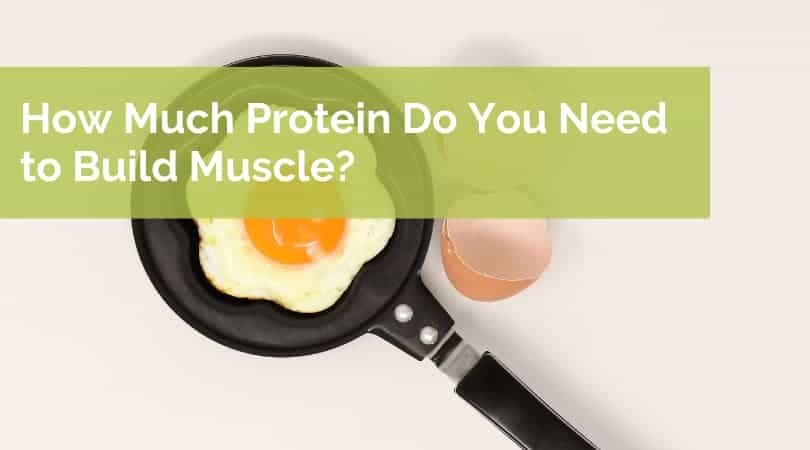
How Much Protein Do You Need to Build Muscle?
You have some major fitness goals. You have been hitting the gym regularly and are focused on your gains. You know you need protein to see results, but exactly how much protein to gain muscle do you need? There is a lot of contradicting information out there about protein intake for strength building, so let’s clarify this confusion a bit.
Protein and Your Muscles
Muscles are made of protein, so it makes sense that you need protein to make new muscle. During strength training, microscopic tears occur in the muscle. These tiny tears need to be repaired and when they are, this makes the muscle slightly bigger.
In order to repair the muscle, the body needs to be in positive nitrogen (protein) balance. This means it needs additional protein than what it would need under regular circumstances in order to dedicate some of it to muscle building.
Additionally, if your goal is to build muscle and lose weight, eating more protein is the best way to achieve this. When you lose weight, you lose water, fat and also muscle. But increasing your protein intake, while cutting your calories, can help reduce the amount of muscle you are losing.
How Much Protein Do I Need to Build Muscle?
If your goal is to increase strength and build your muscles, how much protein do you need to gain muscle? Opinions on the exact amount for muscle gain vary, but in general, you probably need somewhere from 0.7-1 gram per pound of body weight.
The exact amount of protein may depend on what type of exercise you are doing, your gender, age and how much body fat you currently have. If you have a high percentage of body fat, above 25% for men or 32% for women, you may want to consider basing your protein calculation on lean body mass, instead of total body weight. Fat mass doesn’t need protein like lean mass does.
If you don’t know your body fat percentage, you can easily get it measured at most gyms or purchase a scale that measures body composition. Or to keep it simple and you know your body fat percentage is high, you can just subtract 25% from your body weight to get an estimate.
How to Meet Your Protein Needs to Gain Muscle
Now that you know how much protein you need to gain muscle; how does that translate to actual food? Here are some common high protein foods you might want to include in your diet:
- 1 oz meat, chicken, fish, pork- 7 grams of protein
- 1 whole egg- 7 grams of protein
- 1 cup of cow’s milk- 8 grams of protein
- ¾ cup of yogurt- 8 grams of protein
- 1 oz tofu- 7 grams of protein
- ½ cup beans- 7 grams of protein
- ¼ cup of almonds- 6 grams of protein
- 2 tbsp peanut butter- 8 grams of protein
- 1 scoop Well Wisdom whey protein powder– 15 grams of protein
To make sure you are meeting your protein needs, you want to eat a high protein food at every meal and possibly every snack. The amount you need to eat will depend on your total protein goal.
Don’t eat all your protein at once as your body can only absorb and use so much at a time. Instead, spread your protein intake out evenly throughout the day. Consider including a protein source around your workout, either before or after, to make sure your muscles have the fuel they need to repair.
Choose a variety of plant and animal-based protein. Animal protein contains all nine essential amino acids and is considered a complete protein. Many plant-based proteins are not complete proteins and are missing one or more amino acids. But many plant-based proteins contain fiber and other nutrients that are beneficial for good health. Eating a variety of protein sources is ideal.
The Bottom Line: How Much Protein Per Day to Build Muscle
In the end, protein needs vary and should be determined on an individual basis. It may take some experimentation to find your sweet spot that helps you reach your goals. A good rule of thumb is you are eating enough protein if you are able to go 3-4 hours between meals without getting hungry.
You also don’t want to overdo it on protein. If you start to feel sick, weak, or have stomach pains, cut back. You also need to drink more water if you are going to bump up your protein intake, to prevent dehydration.
If you have some serious body composition goals, consider consulting with a registered dietitian who can calculate your needs and determine the exact right amount for your fitness goals. Or speak to your doctor about the right diet for you.
Eating more protein can help you reach your goals, but you still need to hit the weights to see the real results.
References
- Bosse JD, Dixon BM. Dietary protein to maximize resistance training: a review and examination of protein spread and change theories. J Int Soc Sports Nutr. 2012;9(1):42.
- de Souza RJ, Bray GA, Carey VJ, et al. Effects of 4 weight-loss diets differing in fat, protein, and carbohydrate on fat mass, lean mass, visceral adipose tissue, and hepatic fat: results from the POUNDS LOST trial. Am J Clin Nutr. 2012;95(3):614-625.
- Should You Take Whey Protein Powder After Surgery? - March 2, 2023
- How Much Protein is Too Much? - January 30, 2023
- Is Whey Protein Keto Friendly? - January 30, 2023





